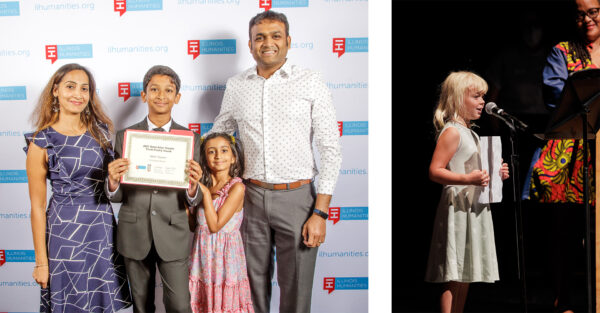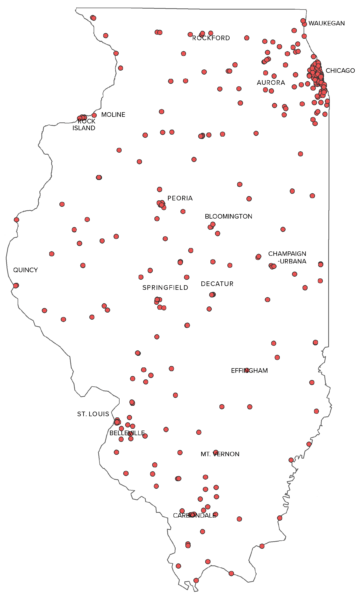A Letter From the Executive Director
April 2023
by Gabrielle Lyon, Executive Director of Illinois Humanities
*Photo of Gabrielle Lyon by Mary Rafferty.

The last few weeks have been a whirlwind of public humanities programs.
The opportunity for any young Illinoisian in Kindergarten through 12th grade to submit a poem to our Gwendolyn Brooks Youth Poetry Awards competition ends May 5th, and we’ve been hosting free poetry writing workshops across the state.
Last week I joined Odisea students meeting in the Brighton Park Branch of the Chicago Public Library. The Odyssey Project/Proyecto Odisea provides free college credit-bearing humanities courses to income eligible adults. As the class unpacked Aztec philosophy, an arcoíris (rainbow) unfurled against the dark sky. It was a fitting intervention for an evening that called for tornadoes.
While immersing myself in the work of our 2023 Public Humanities Awardees, I was introduced to a concept I had not heard of before: “information poverty.” Information poverty is created when people are not able to access the information and content necessary for them to be successful in life – and, ultimately, to participate fully in democracy. The causes of information poverty range from illiteracy and lack of internet access to social factors that create barriers to unfamiliar ideas. The idea is simple, but the implications are profound.
Bans on books, removal of broad swaths of history, limiting who can have access to what information – these are the mechanisms that push entire communities into a state of information poverty.

For people who are passionate about freedom of thought, it has felt like there are tornadoes all around us. In Illinois, efforts are underway to ensure shelter. Take, for example, House Bill 2789, introduced “to encourage and protect the freedom of public libraries and library systems to acquire materials without external limitation and to be protected against attempts to ban, remove, or otherwise restrict access.” In short, it bans book banning.
On April 27 Illinois Humanities will publish a landmark report describing the state of the humanities in Illinois using data we gathered during our COVID-19 relief and recovery grant-making efforts. Over the course of three years, we reached more than 350 organizations throughout the state. The act of distributing these funds gave us a window into the state’s humanities ecosystem and we’ll share what we’ve learned. Some of the findings are concerning – for example, relief funding addressed less than 10% of what organizations needed, and many humanities organizations operate in places without access to adequate broadband.
But more than anything, I hope the report is inspiring. Because in nearly every county in Illinois, there are places of sanctuary: people and organizations who are at work preserving history, making space for dialogue, encouraging curiosity, and bridging differences. Telling – and hearing – each other’s stories is how we weave our civic fabric. At a time when there are efforts all around to make people “poorer,” the humanities can ensure we all have what we need.
I hope you’ll join us on May 17 at the 2023 Public Humanities Awards to hear from our awardees yourself. And if you’re not able to join us in person, please consider a donation. We’ll be sure to put your contribution to good work.
About Illinois Humanities
Illinois Humanities, the Illinois affiliate of the National Endowment for the Humanities, is a statewide nonprofit organization that activates the humanities through free public programs, grants, and educational opportunities that foster reflection, spark conversation, build community and strengthen civic engagement. We provide free, high-quality humanities experiences throughout Illinois, particularly for communities of color, individuals living on low incomes, counties and towns in rural areas, small arts and cultural organizations, and communities highly impacted by mass incarceration. Founded in 1974, Illinois Humanities is supported by state, federal, and private funds.
Learn more at ilhumanities.org and on Facebook, Twitter, Instagram, and LinkedIn @ILHumanities.
Featured image:
left to right: 2023 Public Humanities Awards recipients Alyson Thompson and Stephanie Manriquez, 2023 Beacon Award recipient Tracie D. Hall, and 2023 Public Humanities Awards recipient Rebecca Ginsburg in discussion about information poverty and more. Photo taken at Catalyst Ranch on April 19, 2023.
